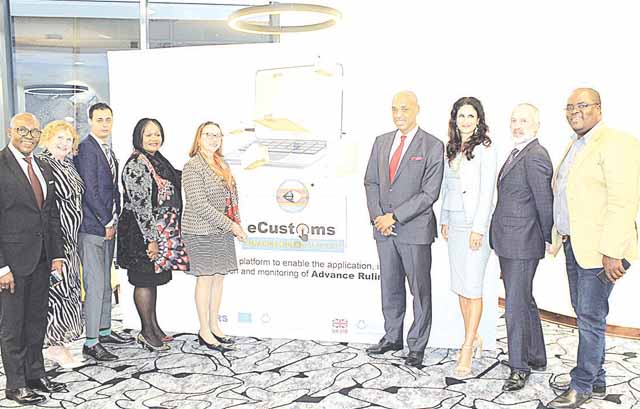By SIFISO NHLABATSI | 2023-05-25

Eswatini Revenue Service has been hailed as a trendsetter when it comes to digital innovation.
This after ERS was the first to launch the e-Customs tariff and yesterday marked another milestone as it became the first to launch the web-based e-Advance Ruling Tool.
In 2022 the ERS in collaboration with the World Customs Organisation (WCO) revised its My Mercator Plan which prioritised among other initiatives, the implementation of the e-Advance Ruling Tool.
The e-Advanced Ruling Tool was officially launched by the Minister of Finance, Neal Rijkenberg at Hilton Garden Inn in the presence of various stakeholders including Eswatini Revenue Service, Business Eswatini and others.
The minister said Eswatini as a member of the WCO and the World Trade Organisation (WTO) has taken the lead to implement a number of trade facilitation initiatives such as the e-Customs Tariff, SADC Electronic Certificate of Origin and now the electronic Advance Ruling Tool. He said the initiative aligned perfectly with the ERS strategic direction.
“The current strategic theme of the ERS is to be digitalised, data driven with our partners,” the minister stated.
He said the strategic vision of the ERS focused on the mobilisation and creation of easy to use digital platforms that did not only benefit customs, but also supported the engagement of the trading community with ERS.
Rijkenberg said the electronic Advance Ruling Tool would be used by the trading community to electronically submit request for advance rulings and by ERS custom’s officers to review, assess, deliver and publish the advance rulings.
He explained that the advance ruling system would be a means to provide decisions on the classification, origin and valuation of commodities prior to their importation or exportation.
Initiative
“This initiative is meant to add certainty and predictability to international trade and helping traders to make informed business decisions based on legally binding rulings. The introduction of this mechanism, is also set as a requirement under the WTO-TFA article 3, WCO Revised Kyoto Convention (RCK) and AfCFTA Annex 4; which will see Eswatini’ s commitments to international standards come to fruition,” he stated.
The minister went on to state that the intended benefits include that the Organisation for Economic Co-operation and Development (OECD) identified 12 trade facilitation indicators, which, when applied in total, could potentially lead to a total reduction in trade costs of 10 per cent.
In a study that was conducted on the impact of trade facilitation measures on trade costs, OECD identified that the advance rulings system was the most impactful single trade facilitation measure. For advance rulings alone, the impact on trade cost was estimated to be a reduction of around 5.4 per cent.
Testament
He said these figures were testament of the fact that this tool had a potential to significantly improve international trade.
According to the minister, trade and customs play an interlinked and critical role in creating conditions for economic development across frontiers.
“Both the ministry of finance through the Eswatini Revenue Service and ministry of commerce and trade have a huge responsibility to facilitate trade hence making a real difference in people’s lives by helping to deliver jobs, growth and development that trade supports,” the minister stated.
He said this meant that Eswatini should leverage on trade facilitation and explore opportunities and ensure that maximum benefits were derived. The minister said this further linked with the overall objective of the government’s road map whose overall objective was to stimulate economic growth and increase employment creation. He said therefore, such tools were meant to create an enabling environment for trade and further attract Foreign Direct Investment (FDI).
British High Commissioner to Eswatini, Simon Boyden said he had seen the ERS strengthen their risk management procedures, improving selectivity criteria that had significantly increased capacity and improved positive hit rates, while facilitating legitimate trade.
He said it was in this context of a long-term strategic partnership, that they were now delighted
to collaborate with the EU, by funding the development of the Electronic Advanced Ruling tool.
“We heard before from Secretary General Mikuriya about how the tool would increase predictability and transparency for traders.
And this really speaks to the Eswatini Revenue Service’s commitment to customer service and building robust public-private partnerships, finding innovative ways to make it easier to do business,” the high commissioner stated.
EU Ambassador to Eswatini, Dessislava Choumelova said she was happy that the country had put in place the electronic advanced ruling tool which ensured modern and transparent operations to allow businesses to gain predictability.
She said this was necessary to stimulate private sector activity in the country.
share story
Post Your Comments Below

Two pedestrians passed away tragically after being knocked down by a motor vehicle whose driver w...

The Central Bank of Eswatini (CBE) has announced a surprising E3.6 billion increase in the countr...

SOCCER - BOYS will be separated from men when the 2024 Premier League of Eswatini (PLE) elections...

SOUTH African amapiano sensation Aymos set the stage on fire and shut the 8th edition of Embiveni...
All material © Swazi Observer. Material may not be published or reproduced in any form without prior written permission.
Design by Real Image Internet